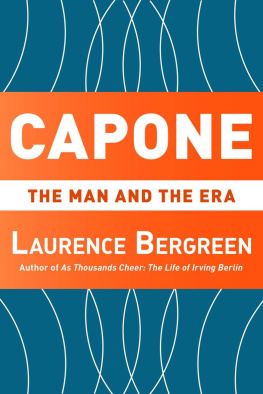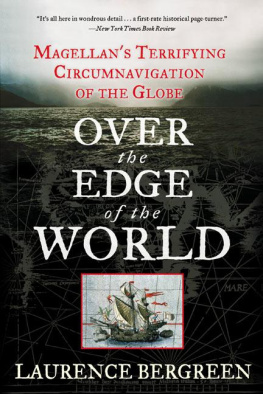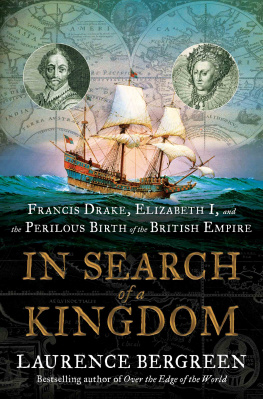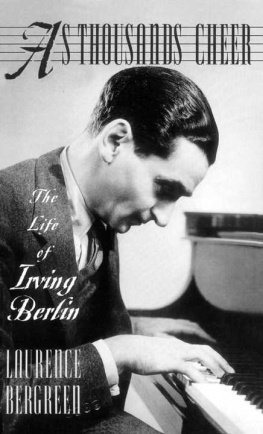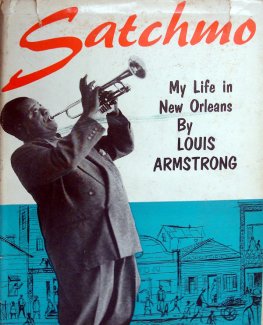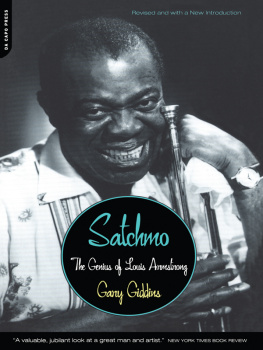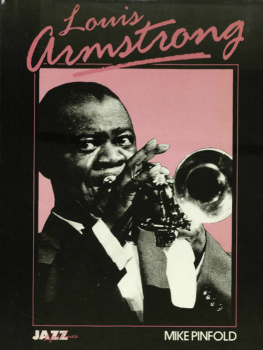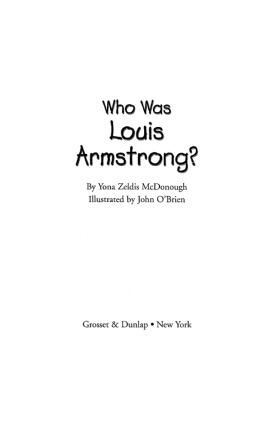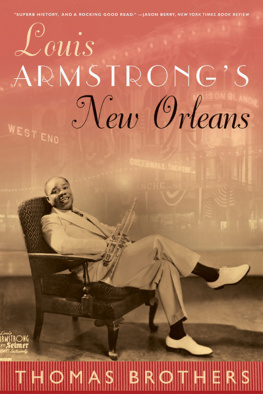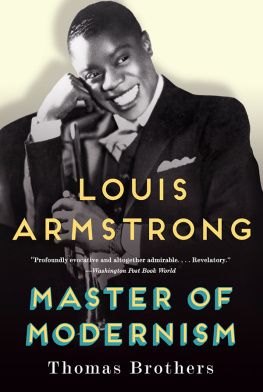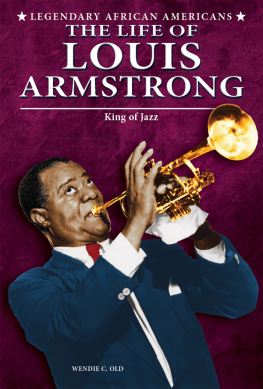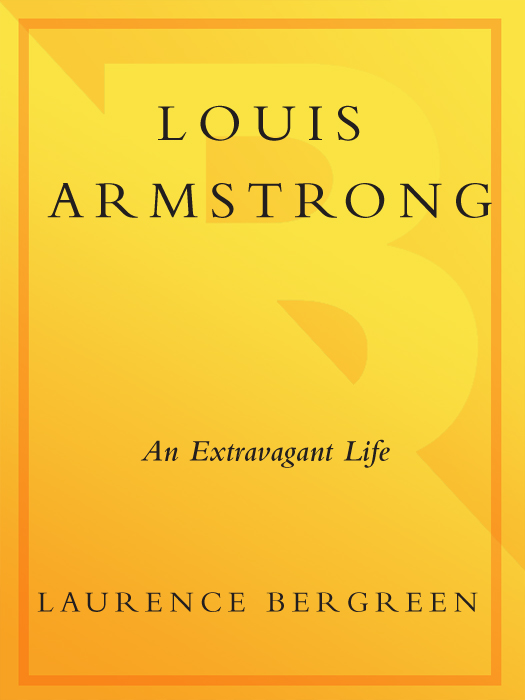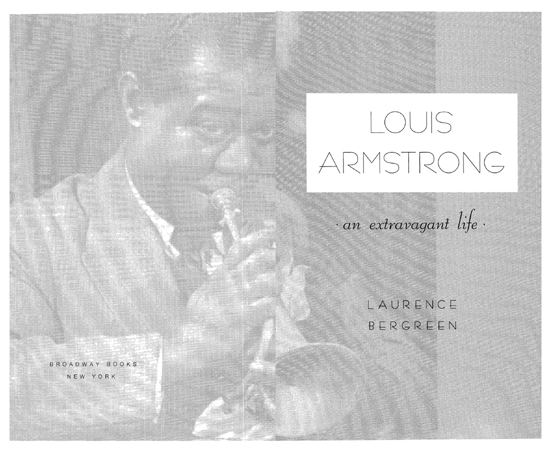Praise for Laurence Bergreens
LOUIS ARMSTRONG
AN EXTRAVAGANT LIFE
which was on the Best Books of 1997 lists for USA Today, the Seattle Times, Publishers Weekly, Booklist, Salon, and the San Francisco Chronicle.
By letting Armstrong speak for himself, Bergreen succeeds in shedding light on a little-understood aspect of his artistic development: his moral development.
New York Times Book Review
[Bergreen] has made a special pilgrimage to his barroom landmark, one of the South Sides few remaining links to an era when it was a training ground for gangsters and a birthing place for jazz.
Chicago Tribune
What biographer Laurence Bergreen enthusiastically pursues here is the story of the man. Impressive and entertaining.
People magazine
Louis Armstrong has been the subject of several books, two of which he wrote himself; but there was still a need for a full scale biography. Laurence Bergreen does much to fill the hefty Louis Armstrong. [It] seems likely to seem definitive for a good long while.
Daily News
Bergreen writes with such virtuosity about organized crime, he hints at an entire book that could be written about the mob and popular music. For anyone without an obsessive knowledge of Armstrong, Bergreens book will be a great place to start acquiring one. There is certainly no time like the present to become an Armstrongian.
Nation
Bergreens Louis Armstrong is the most balanced and complete account yet. One of the reasons that Bergreens book is so welcome is that it attends to Armstrongs endgame triumphs, of which there were many.
Newsday
Veteran biographer Bergreen once again demonstrates a gift for conveying the bone truth about an important figure while never sacrificing a core tenderness towards his subjects frailties and failings. Moreover, he makes us care anew about a misunderstood pioneer. Bergreen has probed more deeply than ever before into the textural milieu of the young Armstrongs New Orleans and the adult Satchmos America. Thanks to Bergreen we meet a man who remained true to himself and his ideals, while making no attempt to disguise the quirks that kept him human.
Billboard
Even the most niggling music lover will respond to Mr. Bergreens admiration for his subjects spontaneous, infectious humanity.
Economist
You can celebrate Satchmos life with this wonderfully written and well-researched biography. Along the way youll learn about America, too, during the Armstrong years, and the forces that shaped him and that he shaped.
Atlanta Journal and Constitution
Louis Armstrong is a loving memorial to a long, mythic career. More than any previous book on Armstrong, Bergreens draws extensively on the mans own voluminous diaries and correspondence. Bergreen gets to the heart of the man.
Time Out
Bergreen has drawn deeply from [Armstrongs] autobiographical writings for his affectionate but flawed portrait of the man. That alone sets him miles apart from [biographer] James Lincoln Collier, who considered Armstrong an unreliable witness to his own life, but there is much more. Bergreen makes himself at home in Storyville, the New Orleans red light district where Armstrong was reared. With great relish he conjures up images of brothels and whores.
Los Angeles Times
Bergreens biography is excellent when dealing with the colorful drama of Armstrongs career and, in his words, the trumpeters distinctly American brand of optimism and striving.
San Francisco Chronicle Book Review
[Bergreens] pleasure and enthusiasm show through on every page. Describing individual [song] titles, Bergreen is always perceptive and makes you want to listen to that particular song.
Salon magazine
BY THE SAME AUTHOR
Capone: The Man and the Era
As Thousands Cheer:
The Life of Irving Berlin
James Agee: A Life
Look Now, Pay Later:
The Rise of Network Broadcasting

A hardcover edition of this book was published in 1997 by Broadway Books.
LOUIS ARMSTRONG: AN EXTRAVAGANT LIFE. Copyright 1997 by Laurence Bergreen. All rights reserved. No part of this book may be reproduced or transmitted in any form or by any means, electronic or mechanical, including photocopying, recording, or by any information storage and retrieval system, without written permission from the publisher. For information address Broadway Books, a division of Bantam Doubleday Dell Publishing Group, Inc., 1540 Broadway, New York, NY 10036.
BROADWAY BOOKS and its logo, a letter B bisected on the diagonal, are trademarks of Broadway Books, a division of Bantam Doubleday Dell Publishing Group, Inc.
First trade paperback edition published 1998.
The Library of Congress has catalogued the hardcover edition as:
Bergreen, Laurence
Louis Armstrong : an extravagant life / Laurence Bergreen.
p. cm.
Includes discography ()
eISBN: 978-0-307-82830-9
1. Armstrong, Louis, 19001971. 2 Jazz musiciansUnited StatesBiography. I. Title.
ML419.A75B47 1997
781.65092dc21
[b] 97-13146 MN
v3.1
T O
B ETSY ,
N ICK,
AND S ARA
My whole life has been happiness. Through all my misfortunes, I did not plan anything. Life was there for me, and I accepted it. And life, whatever came out, has been beautiful to me, and I love everybody.
L OUIS A RMSTRONG
Shakespeare invented Caliban. Who the hell dreamed up Louis? Some of the bop boys consider him Caliban, but if he is, he is a mask for a lyric poet who is much greater than most now writing. Man and mask, sophistication and taste hiding behind clowning and crude mannersthe American joke, man.
R ALPH E LLISON
C ONTENTS
O VERTURE
I n the beginning, he was a sound, and only a sound: a strange blend of happy cacophony and tormented caterwauling. Nothing like it had ever been heard before, not in New Orleans, where he was born in 1901, or Chicago or St. Louis, where he played as an emerging virtuoso cornetist, and certainly not in New York, where Duke Ellington said of his first exposure to that sound, Nobody had ever heard anything like it, and his impact cannot be put into words. Nor had it ever been heard in Europe, or South America, or Africa, but everywhere it would be known as the sound of America.
With this sound, he established more popular songs than any other musician. The sound had two components. There was, initially, a cornetand later a trumpetthat was more expressive than a mere instrument: sweet, stinging, lilting, cajoling, teasing, ebullient. And then there was his voice, the unforgettable voice that behaved like a huge instrument: growling, laughing, demented, soothing, fierce. The combination of the voice that sounded like an instrument and the instrument that sounded like a voice created the universally recognized persona of Satchmo. He looked and felt like a glowing lump of coal, hot and alive and capable of igniting everything around him. For him, music was a heightened form of existence, and he sang and he played as if it could never be loud enough, or last long enough, or go deep enough, or reach high enough. He believed there could never be enough music in the world, and he did his damnedest to fill the silence with all the stomping, roaring, screeching, sighing polyphony he could muster.


